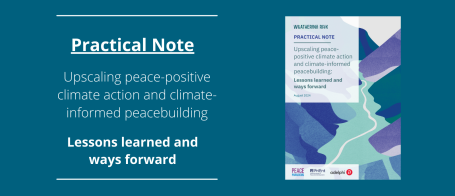Upscaling peace-positive climate action and climate-informed peacebuilding: Lessons learned and ways forward
Read the practical note here.
Evidence shows that climate and environmental change are closely interlinked with conflict. Along indirect pathways, such as undermining livelihood conditions, governance or social cohesion, climate change and other environmental challenges compound factors which drive insecurity and conflict, posing a barrier to peace and stability. This hits countries that are already institutionally and socially fragile particularly hard. Not only must funding increase, but it must account for the special challenges of conflict-affected countries. Indeed, 19 of the 25 most climate-vulnerable countries are also conflict-affected.
To this end, adelphi research, FriEnt and Peace Paradigms Organisation convened a roundtable discussion on Upscaling peace-positive climate action and climate-informed peacebuilding: Lessons learned and ways forward, as part of the FriEnt Peacebuilding Forum 2024. Building on the Declaration on Climate, Relief, Recovery and Peace, which was launched on the COP28’s Peace Day and emphasised the need of conflict-sensitive climate action, the roundtable aimed at feeding into the implementation of Germany’s Strategy on Climate Foreign Policy in a whole-of-government-approach. It also sought to support the mainstreaming of climate- and conflict-sensitive approaches into other policy dimensions.
Share on


